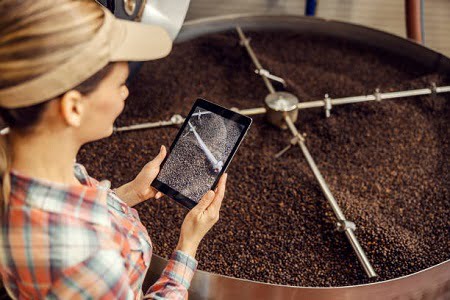Decaf coffee is basically regular coffee with most of its caffeine (at least 97%) taken out. Different processes are being employed to remove caffeine from the beans. Some methods are more natural, while others use chemicals or carbon dioxide. The point of decaffeinated coffee is to let people enjoy the taste and pleasure of coffee who are sensitive to caffeine, have high blood pressure, or suffer from heartburn.
The first commercial decaffeination process was developed in Germany in the early 1900s by Ludwig Roselius. Their method, patented in 1906, involved steaming coffee beans and using benzene to extract caffeine, though this specific solvent was later abandoned due to health concerns.
How is Decaffeinated Coffee Made?
All Coffee beans naturally contain caffeine and there are multiple approaches to removing caffeine from them. Decaffeination methods basically utilize different solvents or water to remove caffeine safely, and once the caffeine is extracted, the beans are thoroughly washed, steamed, and roasted to remove any remaining liquid from the process.

European Method of Decaffeination
The most common method used for the decaffeination of coffee is the European Method also known as the Indirect solvent method. This process involves soaking the beans in chemical solvents, typically methylene chloride or ethyl acetate, which extract the caffeine.
While speedy, effective, and economical, this method has raised some concerns among health and environmental advocates. The U.S. Food and Drug Administration (FDA) has established strict guidelines, permitting only minute traces (10 parts per million) of methylene chloride in the final product. This minute amount is considered completely safe for the health
The Swiss Water Process
The Swiss Water Decaffeination is a chemical-free process for removing caffeine from coffee beans. This method begins by soaking the beans in warm water, which gently extracts the caffeine along with other flavor compounds.
The resulting caffeine-laden water is then passed through activated carbon filters, which selectively capture the caffeine molecules while allowing the flavor elements to remain. This filtered water, now rich in coffee flavors but free of caffeine, is reused to soak new batches of beans, preserving their taste profile.
The Swiss Water process takes hours but offers a natural and eco-friendly decaffeination method.
Ethyl Acetate or Sugar Cane Decaffeination
The Ethyl Acetate (EA) or Sugar Cane Decaffeination process is a method that uses a naturally occurring solvent to remove caffeine from coffee beans. EA, derived from fermenting sugar cane, is considered a more natural alternative to other chemical solvents.
In this process, green coffee beans are first steamed to open their pores, then soaked in an EA solution which extracts the caffeine. This method is praised for preserving much of the coffee’s original flavor while using a naturally sourced solvent.
CO2 decaffeination process
The CO2 Decaffeination process uses liquid carbon dioxide under high pressure to remove caffeine from coffee beans. This method creates a sparkling water effect that extracts caffeine while leaving most flavor compounds intact.
CO2-decaffeination produces good-tasting decaf coffee, as it preserves the beans’ original flavors well. However, this process is more expensive and less widely available commercially compared to other decaffeination methods.
Read a Guide on Different Coffee Processing Methods
Does decaf coffee have caffeine?
Decaf coffee is not entirely caffeine-free but is quite minimal compared to regular coffee. Typically, a cup of decaf contains about 1-5 milligrams of caffeine, compared to 80-120 milligrams in a regular cup of coffee.
According to FDA regulations, decaf coffee can still have up to 3% of its original caffeine content. If you need to avoid caffeine entirely due to a medical condition, it’s best to consult your doctor before consuming decaf coffee.
Read a Guide on Coffee Caffeine Content
Benefits of decaf coffee
1. Loaded with nutrients and antioxidants
Decaf coffee retains most of the health benefits associated with regular coffee, particularly its high antioxidant content. During the decaffeination process, only a small portion of these beneficial compounds is lost.
These antioxidants play a crucial role in protecting cells from damage caused by free radicals, potentially lowering the risk of various diseases and certain types of cancer. Research suggests that these antioxidants can reduce the likelihood of premature death from stroke or heart disease.
2. Reduced Risk of Type 2 diabetes and Liver diseases
Coffee whether caffeinated or decaffeinated helps lower the risk of type 2 diabetes, with studies suggesting that each daily cup could significantly reduce the risk. Additionally, it may benefit liver health by increasing liver enzyme levels and providing a protective effect.
3. No Caffeine Sensitivity or Anxiety
Regular coffee can cause jitters, anxiety, restlessness, and increased heart rate in some people who are sensitive to caffeine. By choosing decaf, you can savor the flavor and ritual of coffee while avoiding these unwanted reactions.
4. Sleep Friendly
Decaf coffee doesn’t wake you up like regular coffee. Caffeine in regular coffee interferes with sleep by blocking adenosine, a key substance in regulating sleep patterns. This means you can enjoy a cup of decaf in the evening or late at night without risking insomnia or sleep disruptions.
Read a guide on the Benefits of Espresso Coffee
For Whom Decaf Choice is a good choice?
Decaf is perfect for anyone who loves coffee’s taste and ritual but wants to avoid caffeine’s potential downsides.
1. People Sensitive to Heartburn or Acid Reflux
Decaf coffee can be a suitable option for individuals experiencing heartburn or acid reflux from regular coffee as caffeine often triggers these digestive issues. Studies show that Decaf coffee stimulates less stomach acid production, making it a better choice for people with sensitive digestion or acid reflux.
2. Pregnant or Breastfeeding Women
Pregnant women often need to limit their caffeine intake to reduce potential risks to the baby. According to the FDA, the recommended caffeine intake during pregnancy is 200 mg/day. So, Decaf coffee provides a lower-caffeine alternative, allowing pregnant women to enjoy the taste of coffee while adhering to recommended caffeine limits.
3. Sensitive to Caffeine or Insomnia
Some people are naturally sensitive to caffeine and experience insomnia, anxiety, or jitters when they drink coffee. Decaf coffee offers a way to enjoy coffee without the stimulating effects of caffeine for those individuals.
In any case, it’s recommended to consult your doctor before shifting to decaf coffee, especially if you have specific health conditions or concerns.
The cons of decaf coffee compared to Regular Coffee
As a die-hard coffee lover, I always reach for a bold cup of regular coffee over decaf because of its stimulant effect and overwhelming taste.
Decaf Coffee vs. Regular Coffee: Stimulant Effects
Regular coffee is known for its stimulant effects, which can improve mood, boost metabolism, enhance athletic performance, and potentially reduce the risk of mild depression. These benefits are primarily linked to caffeine content. In contrast, decaf coffee lacks these stimulant effects, both positive and negative.
Decaf Coffee vs. Regular Coffee: Flavor
Decaf coffee can never taste as good as regular coffee. It tastes and smells different because the decaffeination process, especially solvent-based methods, can strip away some of the beans’ natural flavors and aromatic compounds. Decaf coffee has a milder taste with a thinner body and diminished aroma.
Is decaf coffee bad for you?
Decaf coffee is generally safe to drink, but there is some controversy surrounding the most common decaffeination method, the European Method, which uses chemical solvents like methylene chloride.
The U.S. Food and Drug Administration (FDA) has set a strict limit of 10 parts per million for methylene chloride residues, which essentially eliminates the risk to consumers.
However, if you prefer to avoid this chemical entirely, you can look for decaf options labeled as “Swiss Water Process” or “Natural Decaffeinated”. When purchasing decaf coffee, it’s important to check the label for the decaffeination method. If not specified, it’s likely the coffee was processed using methylene chloride.
Tips for buying the Best Decaf Coffee
Here are some expert tips that might be useful for you while buying Decaf Coffee
1. Check the label
Try to opt for Swiss Water or natural (sugar cane) decaffeinated beans. These methods avoid harsh chemicals and do a great job preserving the coffee’s natural flavors. I find the taste much closer to regular coffee, and I appreciate the more environmentally friendly approach.
2. Freshness
Fresher beans mean tastier coffee. Always check the roast date and try to buy coffee that has been roasted recently to enjoy the best flavor and aroma.
3. Opt for Medium or Higher roasts
I’ve found that medium to darker roasts work best for decaf. These roasts tend to bring out richer flavors and a fuller body, which helps compensate for the slightly milder taste that decaffeination can cause. Plus, the caramelization in darker roasts adds depth and natural sweetness.
Read a guide on different coffee roasts
FAQs
Is decaf coffee ok for kids?
Although decaf coffee has only 1-3% of the caffeine found in regular coffee, the American Academy of Pediatrics advises that children under 12 should avoid caffeine entirely. However, an occasional cup might not do any harm.
Can you still get a buzz from decaf coffee?
No, you can’t get a buzz from decaf coffee because. It contains only a tiny amount of caffeine, insufficient to produce the stimulating effects associated with regular coffee.
Does decaf coffee make you lose weight?
No, decaf coffee doesn’t directly aid in weight loss. However, it’s fine to drink decaf while on a weight loss diet, as it contains minimal calories and won’t negatively impact your weight loss efforts.
Check Out Other Related Articles



